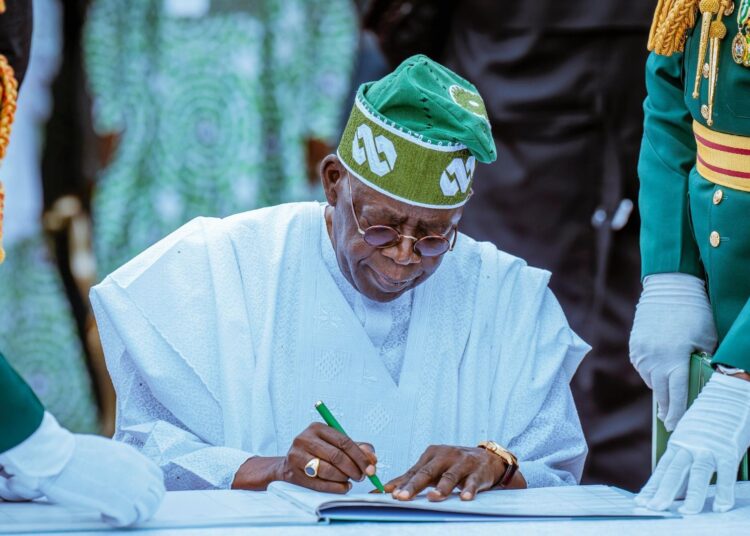Experts have warned the federal government to refrain from fresh borrowing and that if it must borrow for critical infrastructure, it must do so through equity financing.
The experts who spoke to LEADERSHIP yesterday wondered why Nigeria continues to borrow at a time when our debt profile has risen above N150 trillion.
Nigeria’s total public debt rose significantly by 11.6 per cent year-on-year to N152.40 trillion as of June 30, 2025, according to the latest data from the Debt Management Office (DMO) released on Saturday.
This marked an increase of N15.89 trillion compared to the N136.51 trillion recorded in June 2024, highlighting the continued expansion of Nigeria’s debt burden amid fiscal pressures. In dollar terms, public debt grew from approximately $89.15 billion last year to $99.66 billion by June 2025, reflecting a 11.7 per cent year-on-year rise.
On his part, the chief executive officer of Economic Associates, Dr. Ayo Teriba, advised the government to seek equity financing instead of piling up debt.
He said sustainable companies raise more equity than debt.
The National Assembly must begin to approve equity proposals, not just debt, he said.
Similarly, the chief partner at SPM Professionals, Dr. Paul Alaje said any money that is borrowed should have direct impact and should go into infrastructure such as energy, educational infrastructure, health infrastructure, road and rail.
Other than that, according to Alaje, “we discourage borrowing. The worry about borrowing is about the impact on the economy. If you continue to borrow, it’s like pouring more fuel into the fire and hoping that the fire will be put out someday. While I understand the need for more money because of our critical infrastructure and expenditure, the source of money is also very, very important.
“Therefore, our position regarding borrowing will be, see if we are making more in revenue, we need to slow down borrowing. And if we must borrow at all, we must attach this borrowing directly to infrastructure only.”
Also speaking, the chief executive of AntHill Concepts Limited, Dr. Emeka Okengwu, said, “It would not make sense for anyone to say there is no other option apart from borrowing. Maybe consolidating some of the country’s national assets and raising capital against it would do. What is more important is not what we are borrowing but how we are borrowing.
“If we are borrowing, what are we putting it into? That comes to the question of infrastructure deficit. If we are borrowing to shore up our stock of infrastructure, is the infrastructure necessary? If they are necessary, there is nothing we can do but to keep borrowing, hoping that the infrastructure we invest in will begin to attract the investment required, because these are critical demands of attracting investments.
“If we haven’t done this in a long time, two things will happen: the ones you have done already will go back into remission. The ones we have not done will still be waiting for us in the future, considering the fact that demands from our increasing population will be increasing.”
The director/CEO of Centre for the Promotion of Private Enterprise (CPPE), Dr. Muda Yusuf emphasised ‘the importance of addressing the issue of debt sustainability as a priority for our nation’s economic health.’
He suggested that ‘the fiscal space we currently have is being significantly influenced by the burden of debt servicing.’
According to Yusuf, to ensure we can fund essential projects, especially in infrastructure, education, and healthcare, it is crucial that we maintain our debt profile within sustainable limits.
‘One key strategy is to manage the cost of debt effectively, particularly the interest rates we are paying. By ensuring that these rates are reasonable, we can alleviate the overall debt burden,’ he said.
“It is vital that any debt we incur is strategic and supports economic growth. Investment in projects that enhance productivity can lead to improved business performance and economic mobility, resulting in better capacity to service our debt,” he said.
Yusuf added, “Another important consideration is the maturity period of our debt. Short-term debt can pose challenges for servicing, so it is advisable for the government to focus on securing longer-term financing, particularly through multilateral and bilateral loans, which often offer better rates and longer tenors.
“Fiscal consolidation is also a critical area of focus. The government’s ongoing efforts to increase revenue, including tax reforms, are steps in the right direction. A balanced approach of aligning expenditures with revenues will help us reduce fiscal deficits and ensure our debt levels remain manageable.”
CPPE CEO advised against relying on commercial debts, like Eurobonds, which tend to be more expensive to service and less flexible than multilateral and bilateral options.
He disclosed that ,implementing these proposals will be essential in fostering a sustainable debt environment that supports the nation’s growth and development goals.
The DMO breakdown shows the federal government’s debt accounts for N141.08 trillion or 92.6 per cent of the total, consisting of N64.49 trillion in external borrowings and N76.59 trillion in domestic liabilities.
Nigeria’s external debt increased to $46.98 billion (N71.85 trillion) in June 2025, up from $42.10 billion (N66.56 trillion) a year earlier.
Multilateral creditors, including the World Bank, African Development Bank, IMF, and Islamic Development Bank, hold nearly half of the external debt, with the World Bank alone holding $18.04 billion, about 38 percent of total external obligations.
The DMO breakdown, on Saturday, shows the federal government’s debt accounts for N141.08 trillion or 92.6 percent of the total, consisting of N64.49 trillion in external borrowings and N76.59 trillion in domestic liabilities.
Nigeria’s external debt increased to $46.98 billion (N71.85 trillion) in June 2025, up from $42.10 billion (N66.56 trillion) a year earlier. Multilateral creditors, including the World Bank, African Development Bank, IMF, and Islamic Development Bank, hold nearly half of the external debt, with the World Bank alone holding $18.04 billion, about 38 percent of total external obligations.
Bilateral loans stand at $6.20 billion, dominated by the Export-Import Bank of China’s $4.91 billion exposure. Commercial borrowings, largely from Eurobonds, reached $17.32 billion—36.9 per cent of the external portfolio—posing risks amid global market volatility. Domestically, Nigeria’s debt increased by 11.2 percent year-on-year to N80.55 trillion in June 2025 from N72.41 trillion in June 2024.
Federal government bonds represented the bulk of local debt at N60.65 trillion, largely comprising FGN bonds, securitised Ways and Means advances from the Central Bank of Nigeria (CBN), and dollar-denominated bonds.





